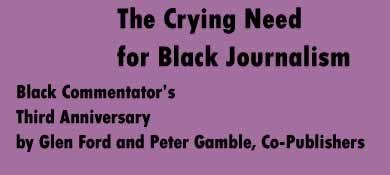
Issue 133 - April 7 2005
Printer Friendly Version
|
On this occasion of The Black Commentator’s Third Anniversary, we the publishers salute you, our readers. You are a very special group of people, now numbering between 30,000 and 40,000 unique visitors per weekly issue – nearly 100,000 individuals per month. We know you are a special group, because we picked the first 20,000
or so of you, based on your political activism and influence, as we
prepared to launch the site on April 5, 2002. Most of the rest of you
were introduced to us by extremely intelligent friends and co-strugglers.
Without a doubt, Ours is a political mission – as is yours. The twin evils of corporate dominance over civil society and racial oppression – and the ghastly horror of war – leave no room for ambivalence about the duties of decent citizens who are also journalists: they must fight the powers that be. For most of the history of Black people in the United States, the obligations of advocacy for justice were a given among African American journalists. Oppression and exploitation are objective realities, not questionable notions to be carefully balanced by lies. Liars and thieves have no rights that honest men and women are bound to respect. There was a time when such values were near-universally understood among African Americans who called themselves journalists. No more. Now, for far too many, journalism has become simply one more route to individual upward mobility, devoid of social obligation and contemptuous of truth.
We did not at first realize how critical a role In the process, we also made the front page of the New York Times
in the first two weeks of publication. Newark Mayor Sharpe James secured a narrow victory, but Alabama Rep. Earl Hilliard and Georgia Congresswoman Cynthia McKinney were ousted by the same corporate money machine – with the massive assistance of corporate media. Shamefully, many Black hirelings in the corporate press joined in framing the Right’s message: that African Americans were becoming more conservative. The reality was that, on an historically unprecedented scale, key
African Americans were being bought. In 2005, at least eight members of the Congressional Black Caucus are serving the interests
of corporate America, not their Black constituents. The entrance of
Big Capital into Black Democratic politics has created a political
crisis. So avaricious are our antagonists, they are now acting like cannibals, attempting to devour the American state, as we reported on March 24, 2005 and as Maya Rockeymoore explains in her explosive analysis of Bush policy toward social insurance in the current issue. The threats multiply, and require a vigorous, much more aggressive journalism. Most importantly, what is necessary is a Black journalism that defends the interests of the people as a whole, rather than African American luminaries who are increasingly on the payroll of the enemy. We will try to be that voice. |
Your comments are always welcome. Visit the Contact Us page to send e-Mail or Feedback or Click here to send e-Mail to [email protected] e-Mail re-print notice
If you send us an e-Mail message we may publish all or part of it, unless you tell us it is not for publication. You may also request that we withhold your name. Thank you very much for your readership.
|
